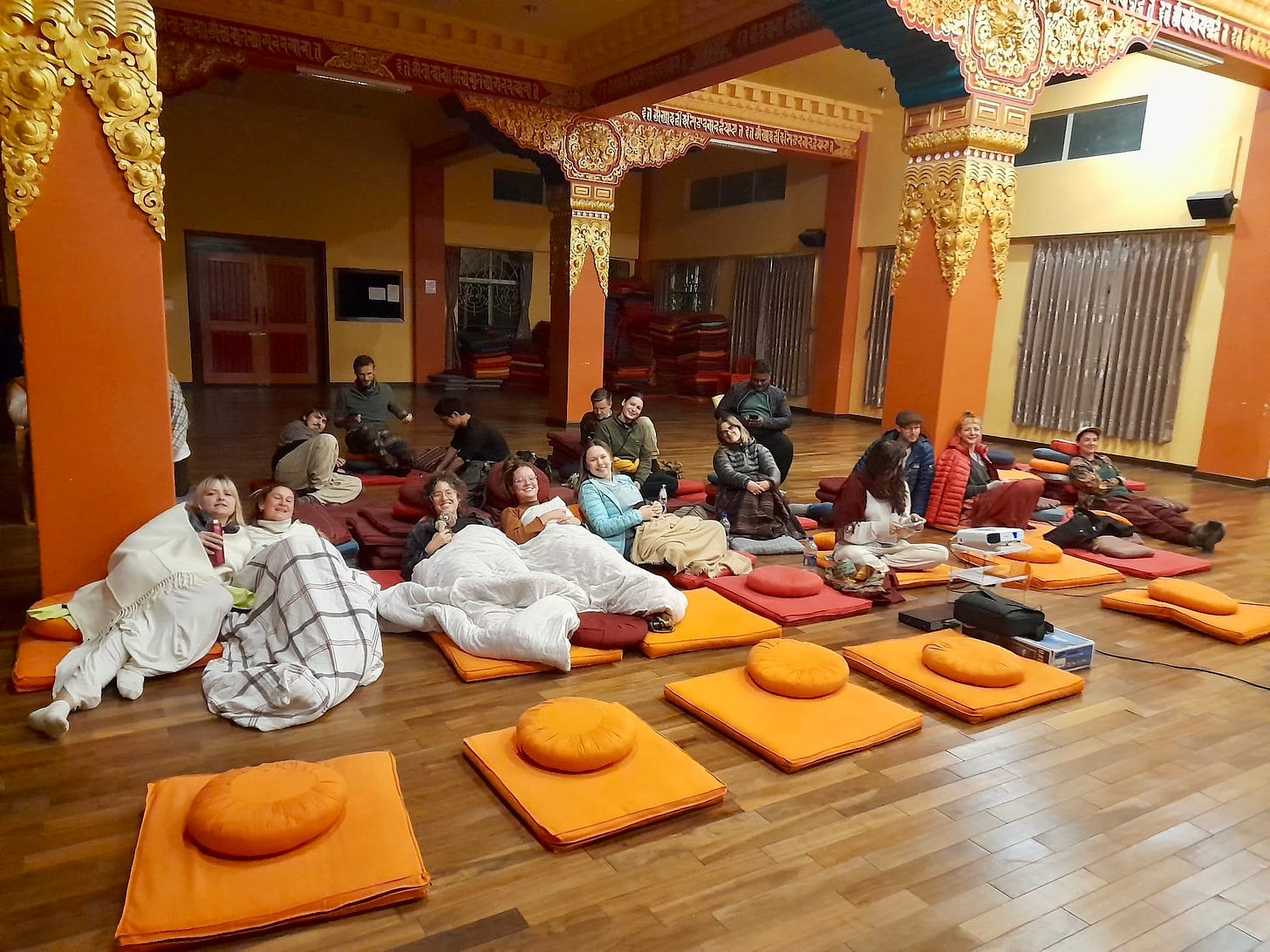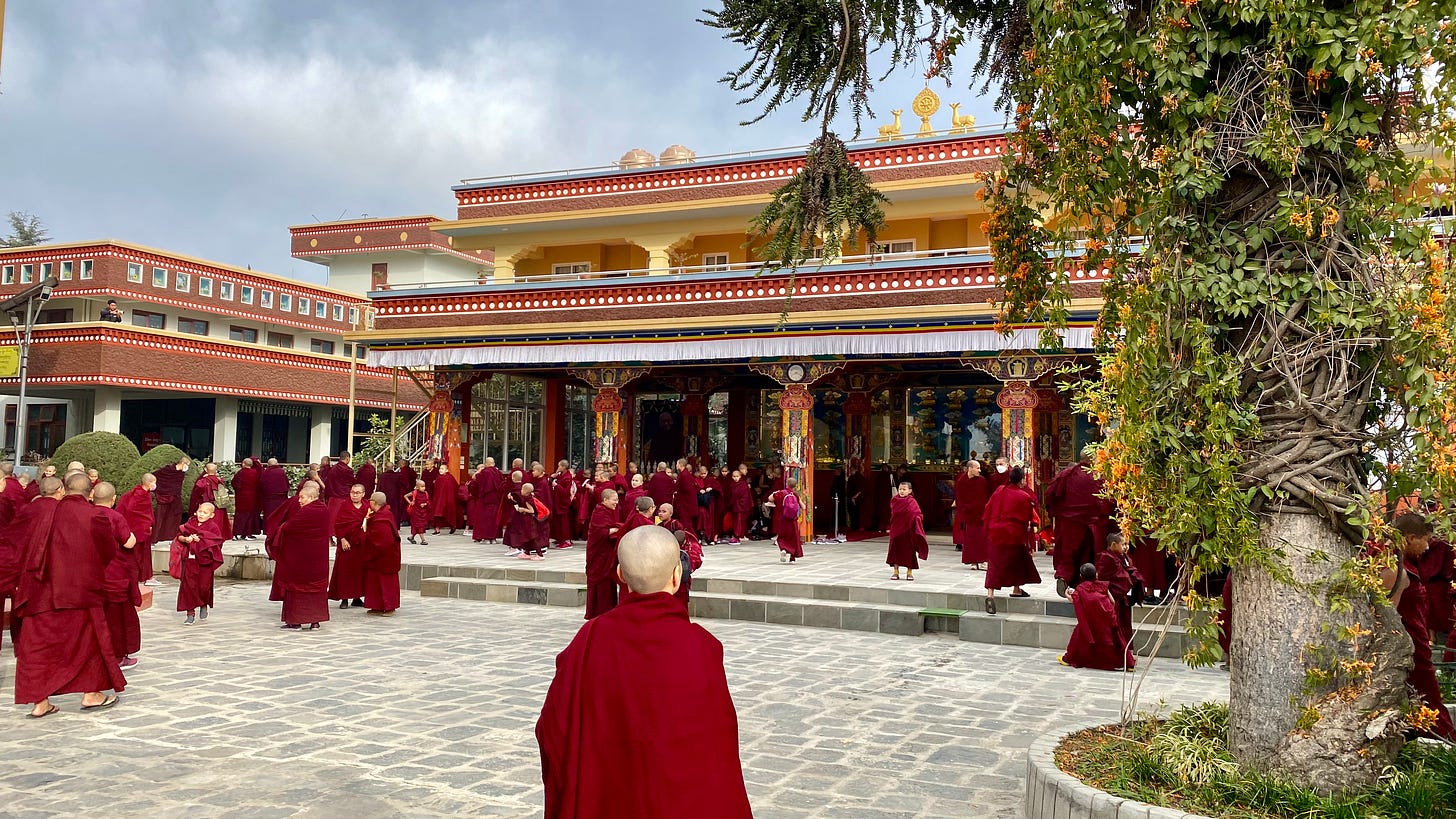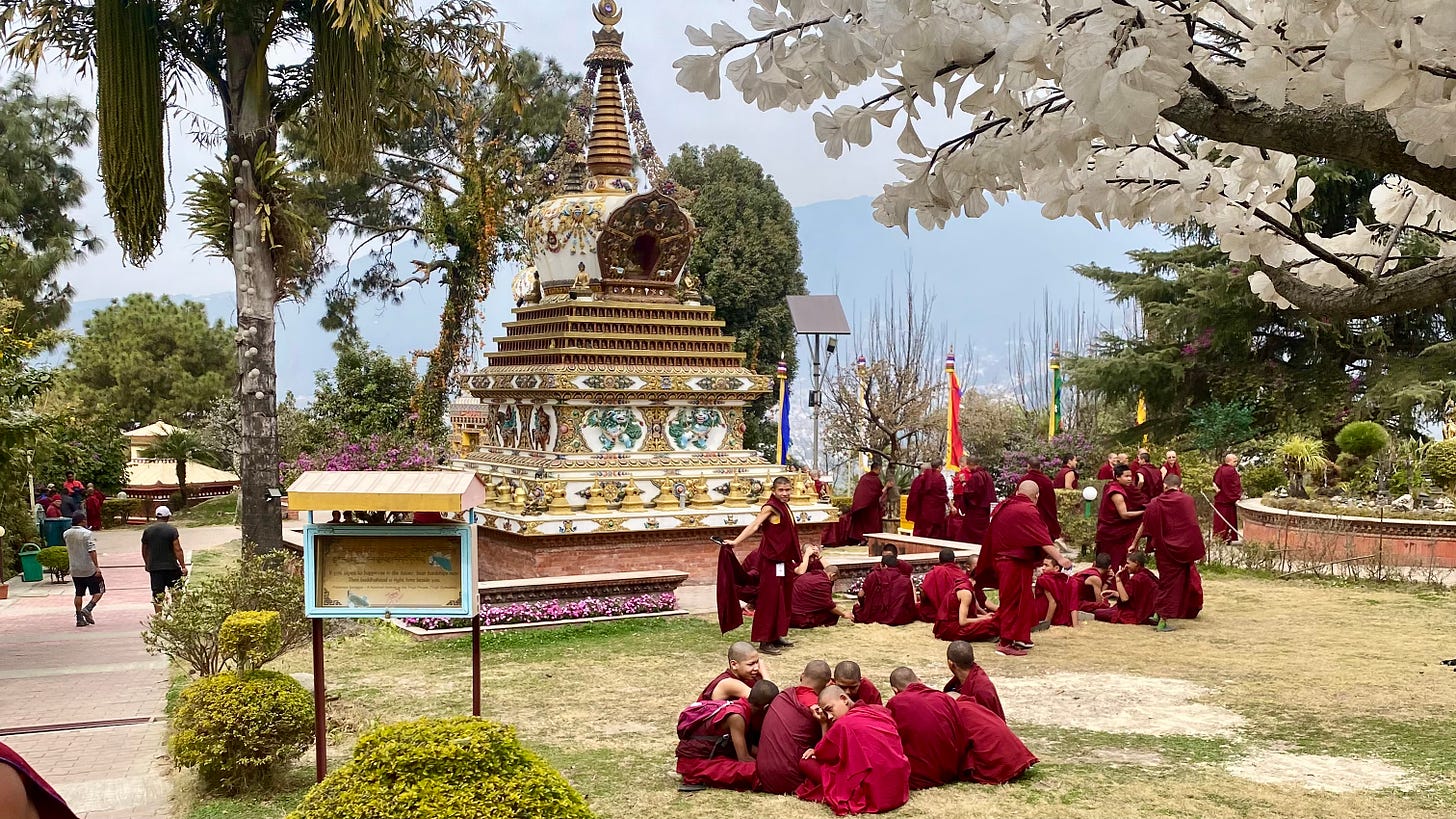Notes from the Monastery: On Compassion, Emotions, and Religion
I spent a week studying Buddhism at a monastery in Nepal. Am I enlightened now?
All of our experiences are based on karma. How do we have sympathy for people with bad karma? We recognize that we have made the same mistakes in some life, and that we are privileged only in this life.
—My notes from Kopan Monastery
An hour before I was about to start a 7-day course at Kopan Monastery, my yoga teacher pulled up. He jumped off his motorbike, my backpack balancing on its handlebars and my daypack wrapped around his shin. On the back of his bike was A, one of my dearest friends from Kathmandu.
“He drove with his leg up on the handlebars the entire way,” she exclaimed.
Earlier that day, we’d all gone to a local Ayurveda hospital. Our teacher, always eager to show his students the real Nepal, jumped in to translate between us and the doctor as we probed for alternative answers to anxiety, PMS, and muscle pain.
By the time we filled our herbal prescriptions, I noticed I was running very late.
“Just go, we’ll get your bags,” they both told me.
Once at the monastery, my teacher dropped my monstrous backpack at reception and we sipped teas at a cafe near its gates.
“Remember, you must have such good karma to even be here. Not everyone has the chance to visit,” he said, while dropping all the advice he wanted me to hold close as I started my time at Kopan.
His active care, in every situation, inspired me. Every morning, he greeted our class with brimming enthusiasm. When one of us felt shaky, he gently coaxed us to confidence. He looked for ways to help: introducing some of us to friends and experts; bringing others trinkets, medicines, and rare Nepalese texts; offering the back of his motorcycle to anyone who had to run an errand after class. Even today, some of us are still in contact with him. His compassion felt like good karma to me: navigating rush hour traffic with his leg resting on the handlebars, balancing my monstrous backpack, while my friend held onto the back rails.
“You must have good karma too, because you’re also here,” I joked back at him.
The three poisons that lead us away from enlightenment are attachment, anger, and ignorance. They’re also the emotions that cause suffering, especially attachment.
For seven days, I immersed myself in Buddhism at Kopan. Starting at 6:45am, fifty of us would gather in our prayer hall, sitting cross-legged and gazing reverently towards the monk leading our morning meditation. One of Kopan’s nuns, a Canadian woman in her late 50s, shared with us six hours of lectures per day, weaving Buddhist teachings with contemporary science, relatable anecdotes, and even some internet memes. Our course focused on emotions, and the Buddhist understanding of them; primarily: attachment, anger, ignorance, and compassion.
In the weeks after our course, I thought about attachment. I thought about my attachment to reputation as l posted on LinkedIn a month later, sharing my one-year unemployment anniversary but dancing around the news that I’ve starting applying for jobs. Actively, not passively, and not leisurely, but with the fervor of someone who’s ready to return home. I held that urgency like a dirty secret, because was I really going to be the type of person looking ferociously for a new job? I’ve been defined by my big career hits, and then by my bold sabbatical. Would my next role come with the same level of prestige?
“Attachment to praise and prestige is the most difficult attachment to get rid of,” said our teaching nun back at Kopan, sharing how she’s been able to let go of most attachments in life, but not that one. I, too, had pushed through many attachments this year: an attachment to my own room, to stability, to comfort, and even to sitting toilets. My attachment to prestige, however, was the last one standing.
Compassion has three components: noticing the suffering of another sentient being, feeling the pain (empathy), and acting to ease the suffering. Compassion is not pity, attachment, empathy, or wishful thinking. It is also not conditional or self-regarding.
My last day at Kopan, I found out that a family member I love had died. I found out because I cheated. I turned on my phone before our last morning lecture, before we were free to return back to the world. I turned on my phone to a series of, “can we talk?,” texts from my parents. I replied with a quick, “is it urgent?”, and was alarmed when my mother sent an immediate response back: “yes.”
In Kopan’s meditation hall, most of us always sat in the same place. I sat in the third row, on the left, slightly off center. A friend of mine often sat in the first row, at the very edge. The two of us became friends because, honestly, we kept awkwardly staring at each other. She was the first Black person I had seen in Nepal, and her curls engulfed her face with a level of volume I have always envied. She saw me that morning looking glum, and ran over to offer me some candy. “Here, take some!,” she beamed, blushing with embarrassment when I explained to her that my melancholy was a little more complicated.
The next day, she would call me with her own personal drama, and we’d talk on the phone for an hour discussing what she should do next. For the next two weeks, we would stay close to each other. Without a thought, we acted on our shared compassion, always jumping in to ease each other’s suffering.
I thought about compassion when I read
’s essay a few weeks ago (Is the Internet Making Me Useless?).Alex pushes on the same questions I’ve asked myself and those around me as we talk about Gaza. Are we operating with compassion? Are we acting to ease suffering? How much pity, attachment, and wishful thinking cosplays as compassion in discussions on Gaza — and on many global crises? How much is rooted in peer pressure, in reputation, in desire to look like we care? And most importantly, how do we change?
I walked away from Kopan, and from Alex’s essay, with a commitment to act. I committed to turning empathy into compassion.

Things that cause suffering: birth, sickness and injury, old age, death, not getting what we want, getting something we don’t want, loss of what we want, having a body and mind.
My first night at Kopan, a monk found me sobbing, leaning against a statue, bags on a patch of dirt surrounding it.
“Why are you crying?,” he obviously asked me.
It was dark, and I couldn’t find the building I was staying in. Because I arrived late, I was shoved to one of the older buildings in the back of campus. I tried to remember the intricate directions to find it: take this staircase, then this one, go down the alley, turn on this dirt road, then cross this mound... I didn’t remember the directions, and had paced the same area for 45 minutes. I soon became convinced that I’d be sleeping outside, finding solace in the fact that a monastery was a pretty safe place to do so.
Luckily, the monk who stopped my crying was able to point me in the right direction. I walked into my room, laughing at the fact that I’d come to Kopan to learn to ‘control my emotions,’ and on my first day I’d already completely lost it.
Buddhism’s been a way for people to seek enlightenment for some time now. Its popularity surged during the 1960s counterculture movement, riding on the rise of hippie culture and free love. I’ve admired Buddhist philosophy for the past decade, appreciating its distinctions from Abrahamic religions: a rooting in compassion rather than obedience, celebration and collaboration with modern science, and an emphasis on introspection and internal questioning to reach nirvana.
As I left Kopan, I thought about how I wanted to integrate Buddhism into my own life. I realized this: as much as I valued Buddhist teachings, this religion, too, had been romanticized. Buddhism centers around messages of peace and love — as many faiths do — but as I looked for an antidote to Abrahamic religions, I realized the vast similarities between them all. Tibetan Buddhism comes with a strict hierarchy. It is ruled by men often born into the role, who sometimes used that power against those who have less. It includes traditions that I view with skepticism, like raising babies as reincarnations of famous religious leaders, and moral views that clash with mine, like notions about gender and sexuality.
I broke my illusion of Buddhism, instead realizing that any social structure that humans touch will show scars. Buddhism still does, however, provide an impressive, science-backed framework to improve our human experience. It pushes us to analyze how our mind impacts happiness, to sit closely with ourselves in meditation, to develop our own sources of wisdom, and to cultivate compassion for all living beings. In understanding ourselves, we understand our own mortality, and we understand those around us.
The beauty of Buddhism is that you’re allowed — and encouraged — to take only what serves you. Whatever you use will move you closer to enlightenment in this life. Anything that’s left, you can learn in the next one.
All I know is that I, myself, exist.
So I’m curious:
What are some attachments that you’re trying to get rid of?
Where are some places that you’ve gone looking for ‘enlightenment’?
How do you try to show compassion when it’s overwhelming?
Last week, some amazing people and I kicked off
, a writing community for Black, Indigenous, and People of Color / the global majority. beautifully led our first session last Friday, and we’ll write together every week. Subscribe to LockedIn here to join us Fridays @ 9:00AM ET. It’s something special. 🧡








Hi Zefan, I've appreciated being able to follow you on your journey since reading about your experience on the Camino, with my personal experience of having taken intentional time away from my corporate career too. Thank you for the thoughtful reflections and perspectives you've shared in this essay, and your invitation to us to do the same.
While studying yoga philosophy during my time out from work in 2022, I spent more time than I had until that point contemplating the significance of impermanence and attachment. One of the most significant attachments I've practised releasing so far is the attachment I had to my former professional identity as a signifier of my personal worth and value.
Similarly to you, I've also grown to question societal structures and institutions that inadvertently develop to take on a logic of their own, which more often than not are enforced at the expense of recognizing individual autonomy and inherent value without discrimination. I've found it most helpful for me to think about Buddhism as a personal philosophy and life practice from which we are free to discern and take only what resonates and supports us, as you've mentioned too. Lots more to continue reflecting on - thank you for writing and sharing!
I’m happy I finally got to read this, thank you so much for including my essay! You’re actually living the coolest life right now, and I appreciate you letting us witness it. Hope you and the fam are hanging in there okay ❤️